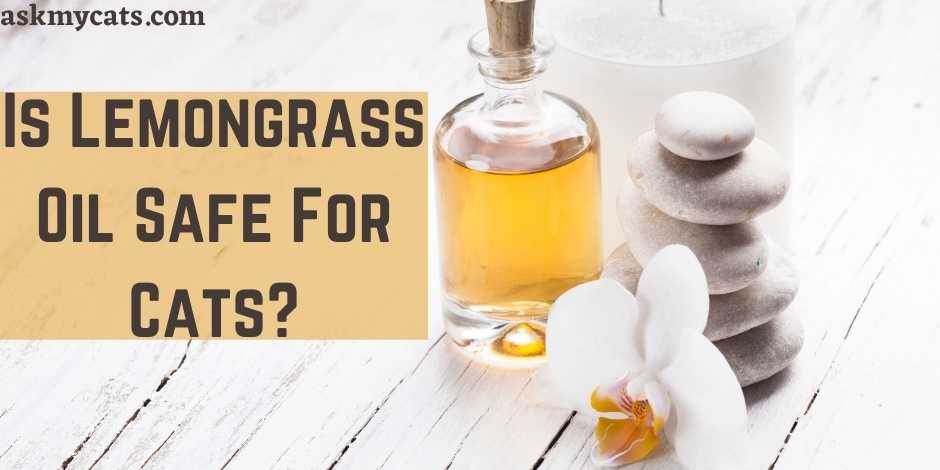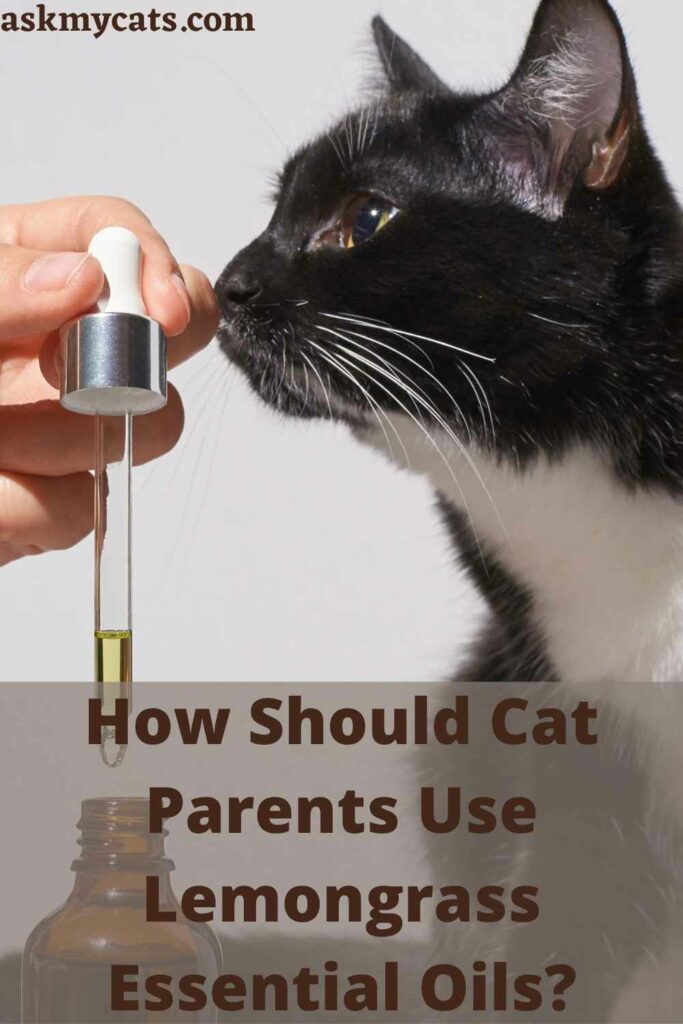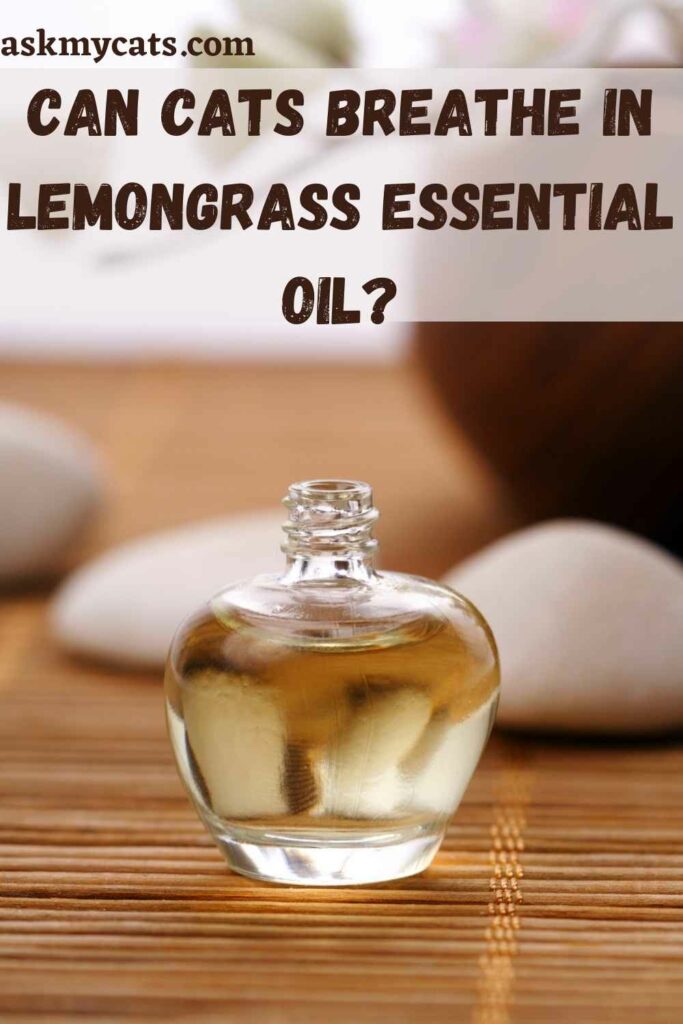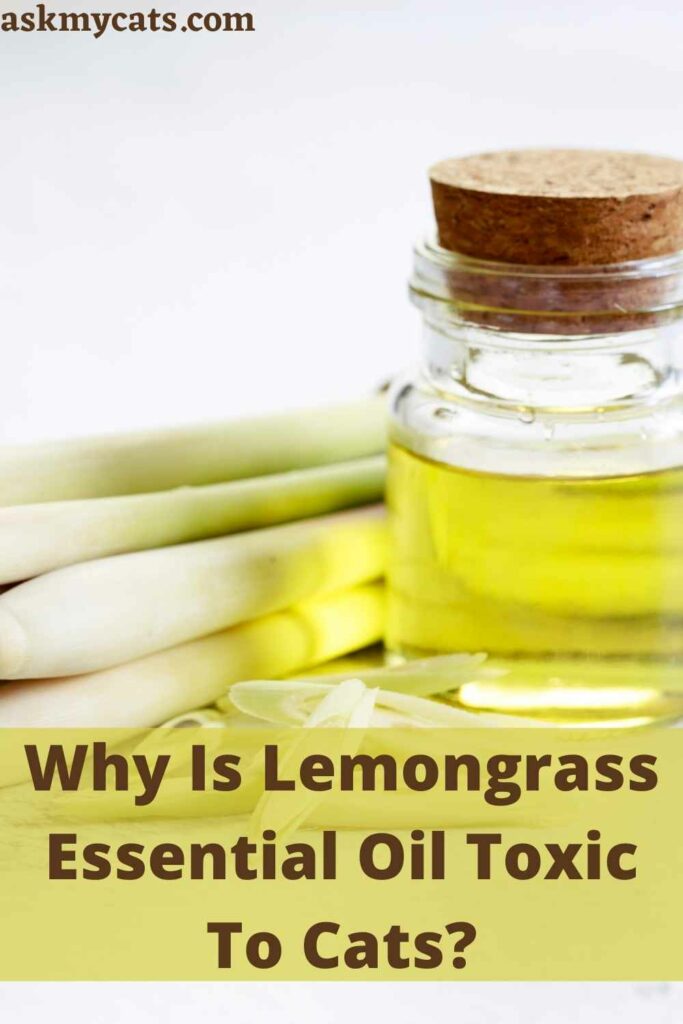Many people use essential oils in diffusers on a regular basis for medicinal or aromatherapy purposes. Others believe that applying essential oils straight to their cats acts as a natural flea and tick repellant. But no one knows why cats tend to keep a safe distance and have a weirder gaze than usual. The kitties are more than likely to dislike the scent of such essential oils.
This leads us to the question, is lemongrass oil safe for cats?
No, lemongrass oil is not safe for cats as in its concentrated state, the essential oil is far too strong to use around cats. It’s possibly fatal if they consume the oil, and diffusing it or using it in any other way around them can also make them sick.
This article will talk about can you use lemongrass oil around cats and is it safe or not.


Give Your Cat the Perfect Day
Get the Free Ebook!
What Is Lemongrass Essential Oil?
Lemongrass is a tropical, grassy plant used in cooking and herbal medicine.
Lemongrass oil is made from the leaves and stalks of the lemongrass plant and has a strong citrus fragrance. It’s a common ingredient in soaps and other personal care items.
Lemongrass oil may be extracted, and it’s been used to treat stomach issues and high blood pressure by healthcare experts. It also has a slew of other possible health benefits.
Lemongrass essential oil is a popular aromatherapy tool for stress, anxiety, and depression relief.
Lemongrass oil is most commonly available as a hydrosol, which is a non-alcoholic scent created by steam-distilling or hydro-distilling plant matter. It should not be consumed or applied directly to the skin of cats.
How Should Cat Parents Use Lemongrass Essential Oils?
Cats parents should use lemongrass essential oils in the following way: –

1. Dilute The Oil
Before using lemongrass essential oils on cats, even natural and 100 percent pure essential oils must be diluted.
Pure vegetable oil or other carrier oils can be used to dilute your oils.
Also, make sure you’re using therapeutic-grade essential oils. Dilute your essential oils at a 40:1 ratio.
It means you’ll need 40 drops of carrier oil to dilute one drop of essential oil.
Apply a single drop of this diluted oil to your cat’s entire body, from ear to tail.
2. Use A Diffuser
The most common technique to receive the benefits of aromatherapy on cats though is through diffusing essential oils via a diffuser.
While humans have enjoyed the beneficial effects of essential oils in improving health, people have also begun using them on animals to see if they have the same wonderful effects on pets. One effective method has been to use essential oils through a diffuser.
3. Start cautiously And Observe
Begin slowly and with caution. At first, we recommend putting 3-5 drops of lemongrass essential oil in a diffuser filled halfway or more with water, then diffusing them.
Every pet is distinct. While introducing essential oils to your cats, keep a close eye on them. Keep an eye out for any changes in behavior or other problems.
It is critical to only use therapeutic-grade essential oils. Many issues would arise if you purchased expensive but low-quality products and used them on your cat.
Do Cats Like The Smell Of Lemongrass Oil?
Wheatear a cat will like the smell of lemongrass oil or not is completely dependent upon each individual cat and its personality.
The lemongrass oil aroma is neither on the list of popular scents that cats despise nor on the list of scents that cats prefer.
Using lemongrass oil in your home and near your cat will expose this. Try to check whether your cat is purring and walking about near the diffuser. If yes, then your cat likes the smell of lemongrass oil.
Can Cats Breathe In Lemongrass Essential Oil?
It is recommended that cats should not smell lemongrass essential oil as it can lead to several complications including liver damage.

Lemongrass essential oils can be toxic to cats, whether taken internally, applied to the skin, or simply inhaled, according to established research.
Severe liver damage, liver failure, respiratory failure, seizures, and even death can result from exposure.
Felines lack specific enzymes that allow them to properly process various compounds found in essential oils, specifically phenols (a process known as “gluconuridation”).
Phenolic compounds are found naturally in plants and are highly concentrated in essential oils, making the liver the most vulnerable organ to failure.
Airborne essential oils can be inhaled or licked off their fur from essential oil and aromatherapy diffusers, candles, liquid potpourri products, and room sprays.
If you can smell the aroma of the oil, it means there is oil in the air, which can cause respiratory distress.
Can I Use Lemongrass Essential Oil Around My Cat?
Yes, you can use lemongrass essential oil around your cat if you follow the following guidelines: –
- Do not apply or feed essential oils to cats, and do not leave oils in areas where they may come into contact with them. While some oils have insect repellent properties and smell great, there is a high risk of serious or fatal reactions in your cat. Your inquisitive pet will appreciate it.
- If your cat suffers from asthma, allergies, or other respiratory conditions, avoid using essential oils at all.
- Cats should be kept out of rooms with a high concentration of essential oils. Kittens, elderly cats, and cats with liver or respiratory issues should be kept out of rooms with essential oil diffusers.
Many essential oils, including lemongrass oil, may be toxic to cats. In the event of a spill, it is toxic when licked up.
Diffusers that emit a lovely, nose-pleasing aroma may appear harmless, but they can be dangerous because they use water vapor to diffuse tiny oil droplets into the air.
If used in a small space and/or for an extended period of time, inhaling diffused oils is known to cause negative respiratory effects in humans and cats.
It is important to note that cats and dogs are far more sensitive to scents than humans. What you may consider a minor, fragrant scent may be overwhelming and harmful to an animal.
Why Is Lemongrass Essential Oil Toxic To Cats?
Lemongrass essential oil is toxic to cats as cats lack the enzyme needed to break down the essential oil which can lead to liver disease.

Essential oils are volatile, organic plant constituents that contribute to fragrance and flavor.
Plants are distilled or cold-pressed to extract them.
Essential oils are used in a variety of applications, including insecticides, aromatherapy, personal care products (such as antibacterials), flavorings, herbal remedies, and liquid potpourri.
Lemongrass essential oils can be toxic to household pets, particularly cats.
They are rapidly absorbed both orally and through the skin before being metabolized in the liver.
Cats lack an essential enzyme in their liver, making it difficult for them to metabolize and eliminate toxins such as essential oils.
Cats are also extremely sensitive to phenols and phenolic compounds, which can be found in essential oils. The higher the concentration of essential oil (i.e., 100%), the greater the risk to the cat.
Symptoms can include drooling, vomiting, tremors, ataxia (wobbliness), respiratory distress, low heart rate, low body temperature, and liver failure, depending on the amount involved in the exposure.
If you notice any of these symptoms, immediately move your cat to fresh air, and if the symptoms do not improve quickly, take your cat to a veterinary emergency center. The veterinarian may note a low heart rate, low blood pressure, and signs of liver failure.
The higher the essential oil concentration, the greater the risk to your cat. If your cat inadvertently consumes any oils, take him or her to the veterinarian right away.
Cats absorb lemongrass essential oils that come into direct contact with their skin. Diffused oils in the air are inhaled, which can cause respiratory problems.
They can also accumulate on the fur, resulting in your cat ingesting them while licking and cleaning. Toxicity can occur very quickly or gradually over time.
Frequently Asked Questions
What is lemongrass poisoning?
Cats normally moderate the amount of food they eat or nibble, but some cats may not be able to moderate the amount of grass they ingest, including lemongrass. This may cause a mild gastrointestinal upset. If your cat ate a lot of this grass, he or she is at a high risk of developing an intestinal blockage. Because this grass is so appealing to cats, you may need to limit its access. Lemongrass essential oil, which is concentrated lemongrass essence, may be harmful to your cat. It lacks the liver enzymes required to break down the compounds in this essential oil. If your cat has a strong desire for lemongrass, it may be suffering from a nutritional deficiency or illness.
What is the treatment of lemongrass essential oil poisoning in cats?
Your veterinarian will administer treatments to help your cat recover. These treatments may include an IV, especially if your cat is in pain. While the cat is still under anesthesia, the veterinarian will repair any damage caused by the lemongrass oil. Your veterinarian will perform liver function tests on your cat. This will need to be closely monitored to ensure that liver damage does not occur. To reduce the likelihood of this happening, your vet will force your cat to vomit, wash out your cat’s stomach, and use activated charcoal to absorb any toxin that remains in your cat’s body.
What are the don’ts while using lemongrass essential oil around cats?
Undiluted lemongrass essential oils should not be applied to any part of a cat’s body. Cats have a habit of licking themselves for hygiene. Even if you apply lemongrass essential oil to the cat’s tail, it will lick the oil off its fur. When lemongrass essential oil is applied directly to the skin, they are far more effective (yours or that of your cat). Lemongrass essential oil diffused in a room is much safer for your cat than applying oils to his or her body. Avoid touching your eyes, nose, mouth, and paws. Even if you have diluted lemongrass essential oil, avoid those sensitive areas on your domestic cat. After using essential oils on yourself, do not pet your cat. Use caution when applying essential oils to your skin via body care products, lotions, or creams. Because your cat may come into physical contact with you and lick the oil content of your skin (which does happen!). Before petting her, you must wash your hands.
Final Words
The risks of using lemongrass essential oil in your home outweigh the benefits, particularly if you have curious cats nearby. Although we do not outright prohibit the use of these oils, we do recommend that you proceed with caution. The essential oil’s form, dosage, and route of administration are all important considerations.
And, regardless of which essential oil or diffuser you use, consult with your veterinarians, do your research, and proceed with caution.
If you have any questions, ask us in the comment section.
